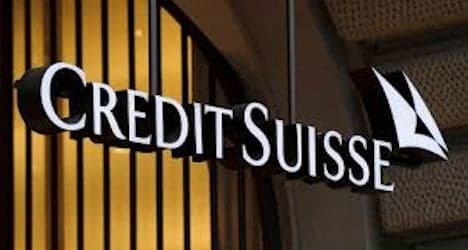Ex-Credit Suisse banker fined for price rigging

British regulators on Thursday fined an ex-Credit Suisse trader for attempting to rig the price of government bonds in order to profit from the Bank of England's quantitative easing programme.
Mark Stevenson was fined £662,700 ($1.1 million) for "deliberately manipulating" a government bond, or gilt, on October 10th 2011, the Financial Conduct Authority (FCA) said in a statement.
Stevenson, who left Credit Suisse in December, was also banned by the FCA from the industry after attempting to exploit the BoE's £375-billion asset purchasing policy, known as quantitative easing (QE).
This marked the first enforcement action for attempted manipulation of Britain's gilt market, and comes in the wake of a series of market rigging scandals.
"Stevenson intended to sell his holding, worth £1.2 billion, to the Bank of England (the Bank) for an artificially high price during quantitative easing (QE) operations that day," the FCA said on Thursday.
"His unusual trading was reported within 40 minutes and the Bank decided not to buy that gilt as part of QE."
It added: "The Authority regards this as a particularly serious example of market abuse, which sought to profit unreasonably from quantitative easing, at the expense of the Bank of England and ultimately the taxpayer at a time when the economy was very weak and confidence in the UK financial system was low."
Under QE, the British central bank creates cash that is used to buy assets such as government and corporate bonds with the aim of boosting lending — and economic activity.
The BoE had launched the radical QE stimulus policy in March 2009, when it also slashed its key interest rate to the current record low level of 0.50 percent.
Following an investigation, the FCA concluded that this was the action of one trader on one particular day, adding that there was "no evidence of collusion with traders in other banks".
"Stevenson's abuse took advantage of a policy designed to boost the economy with no regard for the potential consequences for other market participants and, ultimately, for UK tax payers," added FCA director of enforcement Tracey McDermott.
"He has paid a heavy price for his actions. Fair dealing is at the heart of market integrity.
"This case sends a clear message about how seriously the FCA views attempts to manipulate the market."
The trader faced a potential £946,800 fine but was given a 30-percent discount for agreeing to settle at an early stage.
Global regulators are meanwhile investigating a number of firms linked to the suspected rigging of foreign exchange trading.
The financial sector was also blighted by the Libor interbank interest rate-rigging scandal of 2012 that triggered heavy fines for major international banks and a boardroom shake-up at British bank Barclays.
Comments
See Also
Mark Stevenson was fined £662,700 ($1.1 million) for "deliberately manipulating" a government bond, or gilt, on October 10th 2011, the Financial Conduct Authority (FCA) said in a statement.
Stevenson, who left Credit Suisse in December, was also banned by the FCA from the industry after attempting to exploit the BoE's £375-billion asset purchasing policy, known as quantitative easing (QE).
This marked the first enforcement action for attempted manipulation of Britain's gilt market, and comes in the wake of a series of market rigging scandals.
"Stevenson intended to sell his holding, worth £1.2 billion, to the Bank of England (the Bank) for an artificially high price during quantitative easing (QE) operations that day," the FCA said on Thursday.
"His unusual trading was reported within 40 minutes and the Bank decided not to buy that gilt as part of QE."
It added: "The Authority regards this as a particularly serious example of market abuse, which sought to profit unreasonably from quantitative easing, at the expense of the Bank of England and ultimately the taxpayer at a time when the economy was very weak and confidence in the UK financial system was low."
Under QE, the British central bank creates cash that is used to buy assets such as government and corporate bonds with the aim of boosting lending — and economic activity.
The BoE had launched the radical QE stimulus policy in March 2009, when it also slashed its key interest rate to the current record low level of 0.50 percent.
Following an investigation, the FCA concluded that this was the action of one trader on one particular day, adding that there was "no evidence of collusion with traders in other banks".
"Stevenson's abuse took advantage of a policy designed to boost the economy with no regard for the potential consequences for other market participants and, ultimately, for UK tax payers," added FCA director of enforcement Tracey McDermott.
"He has paid a heavy price for his actions. Fair dealing is at the heart of market integrity.
"This case sends a clear message about how seriously the FCA views attempts to manipulate the market."
The trader faced a potential £946,800 fine but was given a 30-percent discount for agreeing to settle at an early stage.
Global regulators are meanwhile investigating a number of firms linked to the suspected rigging of foreign exchange trading.
The financial sector was also blighted by the Libor interbank interest rate-rigging scandal of 2012 that triggered heavy fines for major international banks and a boardroom shake-up at British bank Barclays.
Join the conversation in our comments section below. Share your own views and experience and if you have a question or suggestion for our journalists then email us at [email protected].
Please keep comments civil, constructive and on topic – and make sure to read our terms of use before getting involved.
Please log in here to leave a comment.